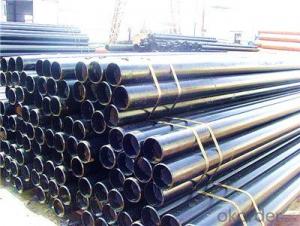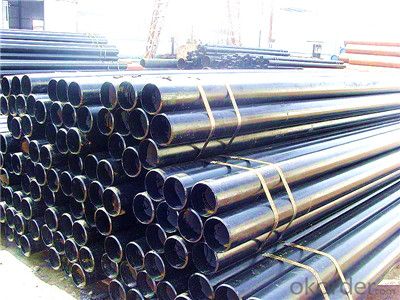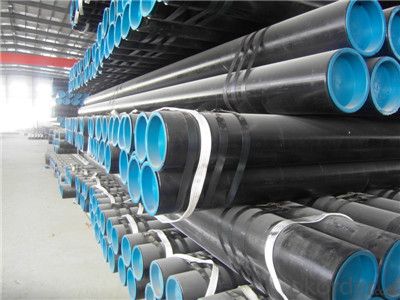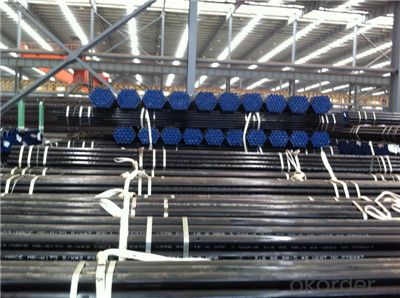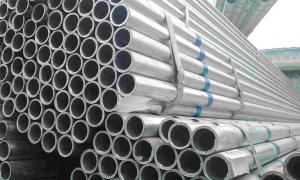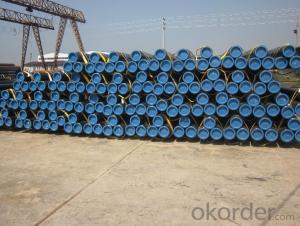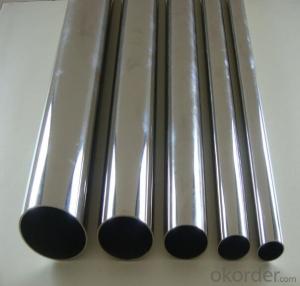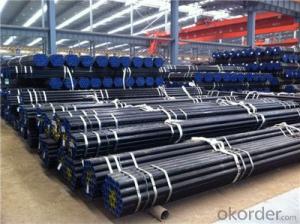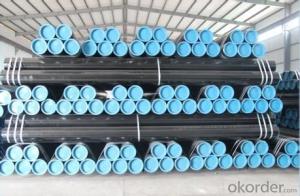High Quality Seamless Steel Pipe with Best Price
- Loading Port:
- Tianjin
- Payment Terms:
- TT OR LC
- Min Order Qty:
- 100 m.t.
- Supply Capability:
- 200000 m.t./month
OKorder Service Pledge
OKorder Financial Service
You Might Also Like
PRODUCT DETAILS
1.Structure of Seamless Steel Pipe Description:
A large amount of Seamless Steel Pipes is offered to the clients at cost effective rates. These pipes are extremely durable, resistant to corrosion and have high tensile strength. Our pipes are used in nuclear plants, power plants, refineries and construction industry across the country. Furthermore, we are capable of providing these seamless pipes to the clients in bulk quantity.
2.Main Features of the Steel Pipe:
• High manufacturing accuracy
• High strength
• Small inertia resistance
• Strong heat dissipation ability
• Good visual effect
•Reasonable price
3.Seamless Steel Pipe Specification:
| Standard: | GB, DIN, ASTM,ASME, ASTM A106-2006, ASTM A53-2007 |
| Grade: | 10#,20#, 45#, 16Mn |
Thickness: | 8 - 33 mm |
| Section Shape: | Round |
| Outer Diameter: | 133 - 219 mm |
| Place of Origin: | Shandong, China (Mainland) |
| Secondary Or Not: | Non-secondary |
| Application: | Hydraulic Pipe |
| Technique: | Cold Drawn |
| Certification: | API |
| Surface Treatment: | factory state or painted black |
| Special Pipe: | API Pipe |
| Alloy Or Not: | Non-alloy |
| Length: | 5-12M |
| Outer Diameter: | 21.3-610mm |
| Packaging Details: | Seaworthy packages, bundles wrapped with strong steel strip |
4.Product pictures
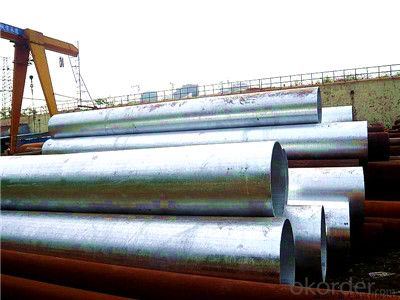
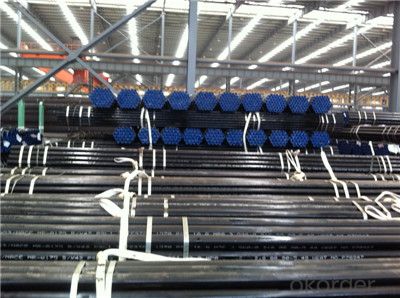
5.FAQ of Seamless steel pipe:
①How is the quality of your products?
Our products are manufactured strictly according to national and internaional standard, and we take a test
on every pipe before delivered out. If you want see our quality certifications and all kinds of testing report, please just ask us for it.
Guaranteed: If products’ quality don’t accord to discription as we give or the promise before you place order, we promise 100% refund.
②How about price?
Yes, we are factory and be able to give you lowest price below market one, and we have a policy that “ for saving time and absolutely honest business attitude, we quote as lowest as possible for any customer, and discount can be given according to quantity”,if you like bargain and factory price is not low enough as you think, just don’t waste your time.Please trust the quotation we would give you, it is professional one.
③Why should you chose us?
Chose happens because of quality, then price, We can give you both.Additionally, we can also offer professional products inquiry, products knowledge train(for agents), smooth goods delivery, exellent customer solution proposals.Our service formula: good quality+good price+good service=customer’s trust.
SGS test is available, customer inspection before shipping is welcome, third party inspection is no problem.
- Q: How are steel pipes used in the manufacturing of wastewater treatment systems?
- Steel pipes are commonly used in the manufacturing of wastewater treatment systems as they provide a durable and corrosion-resistant material for transporting and distributing water and chemicals within the system. They are used for various purposes such as conveying wastewater, carrying treated water to different stages of the treatment process, and transferring chemicals for disinfection or filtration. Additionally, steel pipes are often used for constructing the framework and support structures of wastewater treatment systems due to their strength and versatility.
- Q: What is the difference between steel pipes and PVC-M pipes?
- The main difference between steel pipes and PVC-M pipes lies in their material composition. Steel pipes are made of steel, which gives them higher strength and durability. They are commonly used for high-pressure applications and in areas where the pipes may be exposed to extreme conditions or corrosive substances. On the other hand, PVC-M pipes are made of polyvinyl chloride modified with certain additives to enhance their impact resistance and toughness. They are lightweight, easy to install, and resistant to corrosion, making them suitable for various applications, including water supply, irrigation, and drainage systems. While steel pipes offer superior strength, they are more expensive and require regular maintenance, such as anti-corrosion treatments. PVC-M pipes, on the other hand, are more affordable, require minimal maintenance, and can be easily joined using solvent welding or mechanical fittings. In summary, the choice between steel pipes and PVC-M pipes depends on factors such as the intended use, budget, and environmental conditions.
- Q: How are steel pipes used in the manufacturing of heat exchangers?
- Steel pipes are commonly used in the manufacturing of heat exchangers due to their excellent heat transfer properties and durability. They are utilized as the main components for carrying and transferring hot or cold fluids within the heat exchanger system. The steel pipes ensure efficient heat exchange by providing a smooth and continuous flow of the fluid, while also withstanding high temperatures and pressures. Additionally, steel pipes are often preferred for their corrosion resistance, making them suitable for various industrial applications requiring reliable and long-lasting heat exchangers.
- Q: How are steel pipes used in the construction of underground parking structures?
- Steel pipes are used in the construction of underground parking structures for various purposes, such as providing structural support, drainage, and ventilation. They are commonly used as piles or caissons to support the weight of the structure and prevent it from sinking into the ground. Additionally, steel pipes are utilized for the installation of drainage systems to prevent water accumulation and ensure the structural integrity of the parking structure. They are also employed for ventilation purposes, allowing fresh air to circulate and remove any potentially hazardous gases. Overall, steel pipes are essential components in the construction of underground parking structures, ensuring their stability, safety, and functionality.
- Q: What is the difference between steel pipe and PVC pipe?
- Steel pipe and PVC pipe are both commonly used materials for plumbing and other construction applications, but they have several key differences. Firstly, the material itself is different. Steel pipe is made from steel, which is an alloy of iron and carbon. It is known for its strength and durability, making it suitable for high-pressure applications and underground installations. On the other hand, PVC (polyvinyl chloride) pipe is made from a type of plastic known as PVC. It is lightweight, flexible, and easy to handle, making it a popular choice for residential plumbing and irrigation systems. Secondly, the installation process differs. Steel pipe requires skilled labor and specialized tools for cutting, threading, and welding. It often involves a complex installation process, especially for larger pipe sizes. PVC pipe, on the other hand, can be easily cut with a saw or specialized pipe cutter and joined together using solvent cement or threaded fittings. This makes PVC pipe more suitable for do-it-yourself projects and simpler installations. Thirdly, steel pipe has a higher cost compared to PVC pipe. Steel is a more expensive material, and the manufacturing process for steel pipe is more complex, involving multiple steps and additional materials. PVC pipe, being made from plastic, is generally cheaper and more cost-effective, especially for smaller diameter applications. In terms of performance, steel pipe has higher tensile strength, can withstand higher pressure, and is more resistant to temperature changes, making it ideal for heavy-duty and industrial applications. PVC pipe, on the other hand, has a lower tensile strength but is resistant to corrosion, chemicals, and scale buildup. It is commonly used in residential plumbing, irrigation systems, and other non-industrial applications. In summary, the main differences between steel pipe and PVC pipe lie in the material, installation process, cost, and performance characteristics. While steel pipe is stronger and more suitable for heavy-duty applications, PVC pipe is lighter, easier to install, and more cost-effective for residential and non-industrial uses.
- Q: Can steel pipes be used for scaffolding?
- Yes, steel pipes can be used for scaffolding. Steel pipes are commonly used in scaffolding due to their strength, durability, and ability to support heavy loads. They provide a stable and secure structure for workers to access elevated areas during construction or maintenance projects.
- Q: Can steel pipes be used for underground fuel storage systems?
- Steel pipes are an excellent choice for underground fuel storage systems. Due to their strength, durability, and resistance to corrosion, they are widely used in this application. By opting for steel pipes, one can rely on a secure and long-lasting solution for underground fuel storage. These pipes are capable of withstanding the pressure and weight of the fuel, making them suitable for this purpose. Moreover, their easy weldability and interconnectivity provide flexibility in designing and constructing such systems. However, it is crucial to ensure that the steel pipes used in underground fuel storage systems are properly coated or lined to prevent corrosion and protect the fuel from contamination. Regular inspections and maintenance play a vital role in identifying and addressing any potential issues that may arise.
- Q: What are the different types of corrosion that can affect steel pipes?
- There are several types of corrosion that can affect steel pipes, including general or uniform corrosion, pitting corrosion, galvanic corrosion, crevice corrosion, and stress corrosion cracking.
- Q: How do you remove rust from steel pipes?
- There exist several methods to eliminate rust from steel pipes: 1. Employ a wire brush or steel wool: Initiate the process by vigorously scrubbing the rusted areas with either a wire brush or steel wool. This action will effectively detach loose rust and flakes from the pipe's surface. 2. Administer vinegar or lemon juice: Immerse a cloth or sponge in white vinegar or lemon juice and generously apply it onto the rusted sections. Allow it to remain undisturbed for several hours or, preferably, overnight. The acidic properties of these substances facilitate the dissolution of the rust. 3. Utilize a rust remover or converter: Numerous rust remover products are readily available on the market. Adhere to the product's instructions and apply it to the affected regions. Typically, these solutions transform rust into a water-soluble compound that can be effortlessly rinsed away. 4. Employ a paste comprising baking soda and water: Combine baking soda with water, creating a thick paste. Apply this paste onto the rusted areas and allow it to sit for a few hours. Proceed to scrub the region using a brush or steel wool before rinsing it off. 5. Experiment with a commercially manufactured rust dissolver: Should the aforementioned approaches fail to yield satisfactory results, it may be worth considering the use of a commercial rust dissolver. These products are specifically designed to eradicate rust from various surfaces, including steel pipes. Comply with the manufacturer's instructions accordingly. Kindly remember to equip yourself with protective gloves, goggles, and a mask when handling rust removal products, as they possess corrosive properties and may release toxic fumes. Furthermore, it is advisable to apply a rust-inhibiting primer or paint subsequent to rust removal to prevent future instances of rusting.
- Q: What are the different methods of wrapping steel pipes for corrosion protection?
- There are several methods used for wrapping steel pipes to provide corrosion protection. These methods include the use of tapes, shrink sleeves, liquid coatings, and powder coatings. Each method has its advantages and disadvantages, and the choice of wrapping method depends on factors such as the environment, the required level of protection, and the budget.
Send your message to us
High Quality Seamless Steel Pipe with Best Price
- Loading Port:
- Tianjin
- Payment Terms:
- TT OR LC
- Min Order Qty:
- 100 m.t.
- Supply Capability:
- 200000 m.t./month
OKorder Service Pledge
OKorder Financial Service
Similar products
Hot products
Hot Searches
Related keywords
